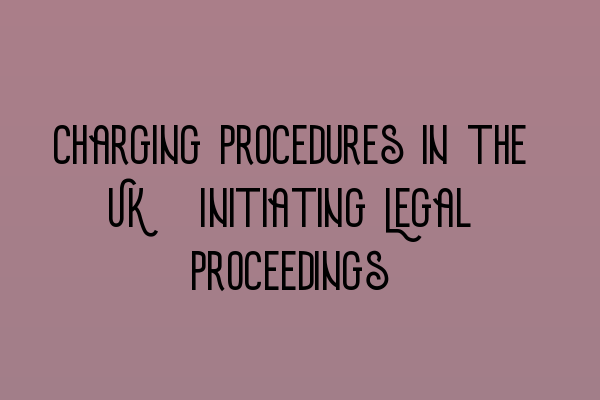Charging Procedures in the UK: Initiating Legal Proceedings
When it comes to criminal law cases in the UK, understanding the charging procedures is essential. Initiating legal proceedings involves a series of steps that must be followed diligently to ensure a fair and just process. In this article, we will delve into the various aspects of charging procedures in the UK and shed light on the key stages involved in initiating legal proceedings.
What are Charging Procedures?
Charging procedures refer to the formal process where the prosecution decides to charge an individual with a criminal offense. It is at this stage that the accused becomes a defendant and the legal proceedings begin. The charging decision is made by evaluating the evidence and deciding whether it is sufficient to proceed with a criminal prosecution.
The Key Stages of Initiating Legal Proceedings
1. Arrest and Detention
Initiating legal proceedings typically starts with the arrest and detention of a suspect. The police have the authority to arrest individuals if they have reasonable grounds to believe that an offense has been committed. Once arrested, the suspect may be held in custody for questioning and further investigation.
2. Investigation
Following the arrest, the police commence an investigation to gather evidence. This involves interviewing witnesses, collecting documents, examining physical evidence, and conducting other relevant inquiries. The quality and integrity of the evidence collected during this stage play a crucial role in determining the direction of the legal proceedings.
3. Charge Decision
After completing the investigation, the police submit the case to the Crown Prosecution Service (CPS) or other prosecuting authorities for a charge decision. The CPS reviews the evidence and determines whether there is enough to justify charging the suspect. If the decision is made to proceed, the suspect will be formally charged with the offense.
4. Initial Hearing
Once charged, the defendant will be summoned to appear before a magistrate’s court or a Crown Court for an initial hearing. This hearing aims to inform the defendant of the charges and provide an opportunity to enter a plea. It is crucial for the defendant to seek legal representation at this stage to ensure their rights are protected.
5. Pre-Trial Proceedings
In pre-trial proceedings, both the prosecution and the defense prepare their cases for trial. This involves exchanging evidence, filing relevant documents, and attending case management hearings. The purpose is to streamline the trial process and address any procedural issues before the trial begins.
6. Trial
The trial is the central stage of initiating legal proceedings. It is where the evidence is presented, witnesses are called, and legal arguments are made. The defendant has the right to be presumed innocent until proven guilty, and it is up to the prosecution to prove their case beyond a reasonable doubt. The verdict, whether guilty or not guilty, is determined by the judge or by a jury.
7. Appeals and Sentencing
If the defendant is convicted, they may have the right to appeal the decision. Appeals can be made on various grounds, such as legal errors or new evidence. Additionally, if the defendant is found guilty, the court will move on to the sentencing stage, where the appropriate penalty for the crime committed is determined.
Conclusion
Understanding the charging procedures in the UK is vital for anyone involved in criminal law cases. From arrest and detention to pre-trial proceedings and ultimately the trial, each stage plays a crucial role in ensuring a fair and just legal process. By familiarizing yourself with these key stages, you can navigate the legal proceedings with confidence. If you require further assistance or legal representation, our team at SQE Criminal Law & Practice Law UK is here to help.
